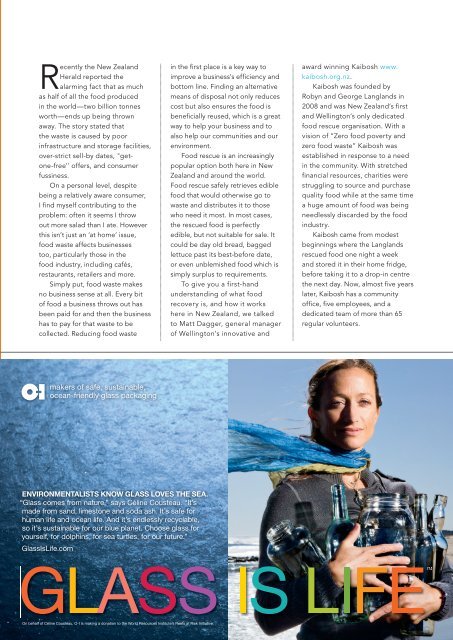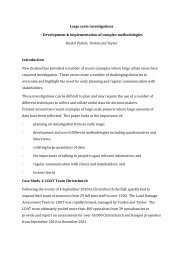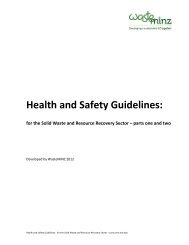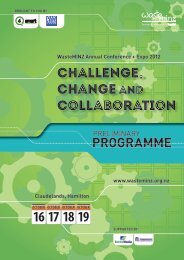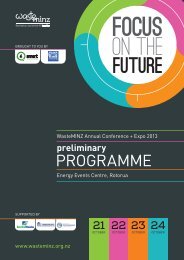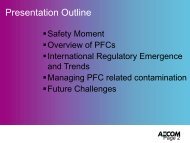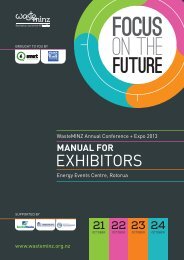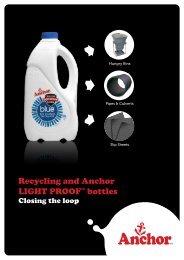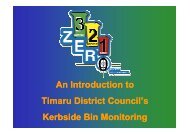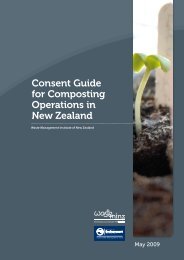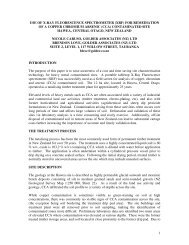Kaibosh
e-WasteAwareness March 2013 - WasteMINZ
e-WasteAwareness March 2013 - WasteMINZ
- No tags were found...
You also want an ePaper? Increase the reach of your titles
YUMPU automatically turns print PDFs into web optimized ePapers that Google loves.
Recently the New Zealand<br />
Herald reported the<br />
alarming fact that as much<br />
as half of all the food produced<br />
in the world—two billion tonnes<br />
worth—ends up being thrown<br />
away. The story stated that<br />
the waste is caused by poor<br />
infrastructure and storage facilities,<br />
over-strict sell-by dates, "getone-free''<br />
offers, and consumer<br />
fussiness.<br />
On a personal level, despite<br />
being a relatively aware consumer,<br />
I find myself contributing to the<br />
problem: often it seems I throw<br />
out more salad than I ate. However<br />
this isn’t just an ‘at home’ issue,<br />
food waste affects businesses<br />
too, particularly those in the<br />
food industry, including cafés,<br />
restaurants, retailers and more.<br />
Simply put, food waste makes<br />
no business sense at all. Every bit<br />
of food a business throws out has<br />
been paid for and then the business<br />
has to pay for that waste to be<br />
collected. Reducing food waste<br />
in the first place is a key way to<br />
improve a business’s efficiency and<br />
bottom line. Finding an alternative<br />
means of disposal not only reduces<br />
cost but also ensures the food is<br />
beneficially reused, which is a great<br />
way to help your business and to<br />
also help our communities and our<br />
environment.<br />
Food rescue is an increasingly<br />
popular option both here in New<br />
Zealand and around the world.<br />
Food rescue safely retrieves edible<br />
food that would otherwise go to<br />
waste and distributes it to those<br />
who need it most. In most cases,<br />
the rescued food is perfectly<br />
edible, but not suitable for sale. It<br />
could be day old bread, bagged<br />
lettuce past its best-before date,<br />
or even unblemished food which is<br />
simply surplus to requirements.<br />
To give you a first-hand<br />
understanding of what food<br />
recovery is, and how it works<br />
here in New Zealand, we talked<br />
to Matt Dagger, general manager<br />
of Wellington’s innovative and<br />
award winning <strong>Kaibosh</strong> www.<br />
kaibosh.org.nz.<br />
<strong>Kaibosh</strong> was founded by<br />
Robyn and George Langlands in<br />
2008 and was New Zealand’s first<br />
and Wellington’s only dedicated<br />
food rescue organisation. With a<br />
vision of “Zero food poverty and<br />
zero food waste” <strong>Kaibosh</strong> was<br />
established in response to a need<br />
in the community. With stretched<br />
financial resources, charities were<br />
struggling to source and purchase<br />
quality food while at the same time<br />
a huge amount of food was being<br />
needlessly discarded by the food<br />
industry.<br />
<strong>Kaibosh</strong> came from modest<br />
beginnings where the Langlands<br />
rescued food one night a week<br />
and stored it in their home fridge,<br />
before taking it to a drop-in centre<br />
the next day. Now, almost five years<br />
later, <strong>Kaibosh</strong> has a community<br />
office, five employees, and a<br />
dedicated team of more than 65<br />
regular volunteers.<br />
makers of safe, sustainable,<br />
ocean-friendly glass packaging<br />
EnvironmEntalists know glass lovEs thE sEa.<br />
“Glass comes from nature,” says Céline Cousteau. “It’s<br />
made from sand, limestone and soda ash. It’s safe for<br />
human life and ocean life. And it’s endlessly recyclable,<br />
so it’s sustainable for our blue planet. Choose glass for<br />
yourself, for dolphins, for sea turtles, for our future.”<br />
GlassIsLife.com<br />
TM<br />
On behalf of Céline Cousteau, O-I is making a donation to the World Resources Institute’s Reefs at Risk Initiative.


